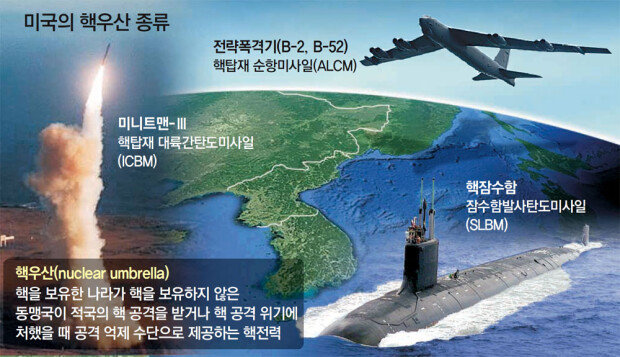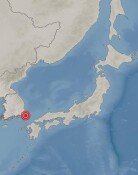Will a Korean Peninsula peace process affect U.S. nuclear umbrella for S. Korea?
Will a Korean Peninsula peace process affect U.S. nuclear umbrella for S. Korea?
Posted May. 04, 2018 08:09,
Updated May. 04, 2018 08:09

Although a latest controversy over the claim that a Korean Peninsula peace agreement could lead to the withdrawal of the U.S. Forces Korea ended up a happening, some people still assert that other controversies could erupt in the process of denuclearization discussions. One of the issues is the U.S. commitment to providing a nuclear umbrella for South Korea.
The commitment is about the United States defending the Korean Peninsula by fully mobilizing U.S. nuclear assets including intercontinental ballistic missiles, strategic bombers and nuclear submarines. A joint communiqué of the South Korea-U.S. Security Consultative Meeting stipulates U.S. provision of its nuclear umbrella as a key point. It is a warning that if North Korean leader Kim Jong Un attacks the South with conventional or nuclear weapons, he could face a “nuclear retaliation” that is hundreds of times bigger in scale. “The nuclear umbrella pledge is a card that deters North Korea from launching a full aggression against the South and neutralize its nuclear and missile development,” a South Korean military official said.
However, controversies over the appropriateness of the nuclear umbrella pledge could emerge if a successful North Korea-South Korea and North Korea-U.S. summits lead to full-fledged discussions of an end-of-war declaration and a peace agreement because the North could demand that the territorial land, air and sea of the peninsula be turned into a nuclear-free zone where no nuclear weapons are allowed.
This would block the U.S. strategic weapons from being deployed to the peninsula, meaning de-facto abolishment of the U.S. nuclear umbrella. Pyongyang has been demanding that nuclear weapons in South Korea be abandoned, that nuclear weapons from the outside be banned from being brought to the South, and that the U.S. nuclear umbrella be abolished. This is why some people argue that the North’s mention of the denuclearization of the peninsula means turning the peninsula into a nuclear-free zone.
Some assert that a nuclear-free Korean Peninsula through complete denuclearization would also mean that U.S. deployment of its strategic assets to the peninsula would be minimized in return for the North’s nuclear abandonment. “It is desirable that the United States maintains its nuclear umbrella pledge until the North’s scrapping of its nuclear program is almost complete and the two Koreas make significant progress in conventional arms reduction,” a high-ranking South Korean military official noted.
hjson@donga.comysh1005@donga.com







